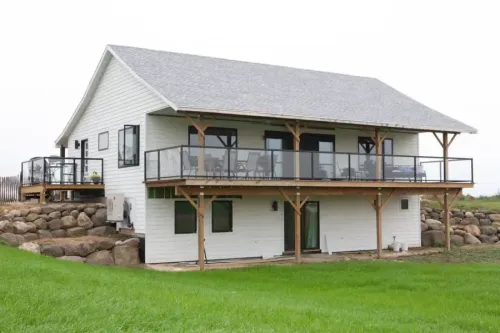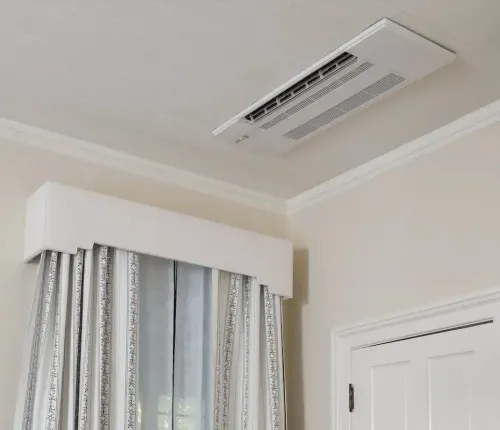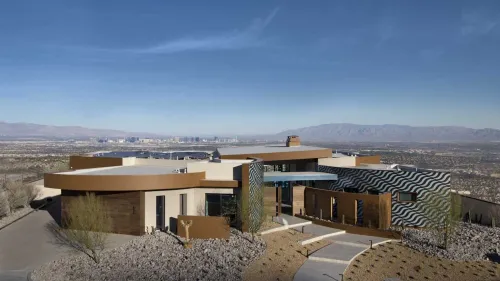Project Location: Dallas, Texas
Completion Date: March 2018
Challenge
Selecting the right mechanical systems for a passive houseSolution
Mitsubishi Electric Zoned Comfort Solutions®Result
An energy-efficient, effective HVAC system that helps ensure a tight, thermal envelope
A code-built home is the worst home you’re allowed to build by law.” Overheard at a recent conference they attended, this is the kind of thinking that motivates Fagin Partners, a Dallas-based, father and son building team. The company was formed in 2016 after Connor Fagin graduated from Baylor University with a prelaw degree focused on efficiency and environmental law.
“My father, Kyle Fagin, was already building energy-efficient homes when I came to work with him,” noted Connor. “We’re talking fully encapsulated homes focused on airtightness with spray foam insulation, seeking a higher SEER and efficiency. He’s done rainwater harvesting on every home he’s ever built. That said, when we started our joint venture, we wanted to do something a little different.”
A few years ago, the Fagins heard about the passive house concept and were eager to bring a high-performance home to Texas. Knowing that efficient mechanical system selection is key to low-load homes, Fagin Partners utilized Mitsubishi Electric’s Zoned Comfort Solutions® and its Performance Construction Team to make the Lively Passive House a reality.
The Passive House Goal
Working with strict requirements for space heating and cooling demand, primary energy demand, airtightness and thermal comfort, the Fagins first approached Ryall Sheridan Architects, who served as the liaison between them and the Passive House Institute.
“Once we explained our goals, they immediately told us, ‘Mitsubishi Electric makes the best HVAC equipment on the market.’ We were pretty much sold from there,” explained Connor. “We then got in touch with Mitsubishi Electric’s Performance Construction Team. It was very important to us that the mechanicals were planned out and installed precisely for this job.”
“Whenever you’re working on a project that’s going for gold in terms of energy efficiency and health, it’s critical to have a whole team working together,” noted Kimberly Llewellyn, performance construction manager, Mitsubishi Electric Trane HVAC US (METUS). “With our team assembled, we were really able to work through the high-efficiency building standards.”
Assembling A Team And A Plan
Ultimately, Llewellyn brought on Jenifer Peek, area sales manager, METUS, and Diamond Contractor® Mike Novotny, Ac 180, to complete the project team. Together, they helped shape the entire home’s layout, specifications and equipment options for the two-story, 3,230-square-foot home. The team considered variables like the home’s geospatial orientation and selected options such as triple-paned windows and doors to ensure a tight, thermal envelope.
“Before we broke ground on this house, it was modeled out into a passive house efficiency model. It took into account the orientation of the home on the north/south access, shading provided by trees and heat gain from the windows,” noted Connor. “Before any construction started, Mitsubishi Electric’s Performance Construction Team had an idea of how much energy this house would use.”
Having a plan for mechanicals on the front end of construction proved to be quite advantageous as well.
“I will never go into a new construction again without the plan already set. I never realized until now how valuable that is,” explained Connor. “One: having an established plan makes the entire development process more predictable, but two: the ultimate execution in this house is terrific. The duct runs are as short as possible and our line lengths are optimized. That is really why you see this house performing so well.”
The Right System For The Job
Ultimately, Ac 180 installed two SEZ Horizontal-Ducted Indoor Units and one PEAD Horizontal-Ducted Indoor Unit with MHK1 Wireless Remote Controllers for the home. They also applied a third- party Energy Recovery Ventilator to bring in fresh, outside air. The effective SEER rating of the equipment is 21. As a Diamond Contractor, Ac 180 had extensive experience working with METUS products and helped make the entire install seamless. “Mike Novotny and his team did a terrific job. From start to finish, it was painless,” said Connor.
The system also left an impression. “We’d never installed Mitsubishi Electric equipment before this project and quite frankly, we’ll probably never use anything else now that we’ve had this great experience,” said Connor. The way that the Mitsubishi Electric systems come together, the way the indoor units hook up to the lines and then hook into the outdoor units is so simple. It’s essentially ‘plug and play,’ which is a much better way of doing things.”
Officially recognized as the first Internationally-Certified Passive House in Texas in March 2018, the Fagin Partners not only met their goal but are now looking to educate the state on why high-performance homes are helpful to the environment and the wallet.
Utility Savings And Monitoring
“The cost of electricity in Texas has increased substantially in the last year. As we don’t fit into the electric grids of the Eastern or Western U.S. states, Texas is more subject to price fluctuations,” explained Connor. “While we were only going from seven and a half to eight cents a kilowatt to about 11, an electricity bill is not something that’s just on autopay anymore for people. Whether you have a new construction home or an existing home, the low-hanging fruit is always the mechanicals. With our passive house, the solid mechanical layout has really pushed it over the edge of performance — that’s why we’re having these ultra-low utility bills.”
With the Ac set around 70 degrees and plenty of lights on throughout the day, the home averages a $25 to $30 electric bill per month. In addition to the passive house, the Fagin Partners have built seven energy-efficient homes on the same street – Lively Lane. Each house they’ve built has an energy monitor, giving Kyle and Connor a side-by-side comparison of the passive house with the other homes. “The passive house per square foot is using less than half of the energy that the other homes we built are using,” noted Connor. “These homes have the same geographical factors and are nearly identical in square footage.”
From an energy consumption standpoint, Connor also noticed a huge benefit with Zoned Comfort Solutions. “I’m on the development team for Sense, a residential energy monitor,” said Connor. “This particular product can tell you down to the single watt any sort of consumption pattern and detects all devices using electricity in the home, whether that be a laptop or a mechanical system. HVAC units are typically one of the first things recognized because of the surplus energy they use. With Mitsubishi Electric equipment it’s so energy efficient that it’s actually below the threshold of being picked up as a ‘device’ by the monitor. One of the SEZ units only uses around 20 watts.”
While the low utility bills are a major perk, the Fagins also knew aesthetics and comfort were very important in creating the residence. “From the beginning, the goal was to take the efficiency to the next level, making the numbers work and creating an inviting and comfortable home,” explained Kyle Fagin, co-owner, Fagin Partners.
Low Noise, High Comfort
Requesting a traditional look, the Fagins wanted people to walk into the house and not immediately think of it as energy-efficient and industrial. “All the HVAC in this house is minimally ducted. While it’s out of sight, we also wanted to make sure it was out of mind,” said Connor. “As Texans, we are all very well acquainted with our air conditioners and didn’t want a ‘light switch’ system that leaves cold spots as well as an audible sound whenever it kicks on. Because of Mitsubishi Electric’s variable technology, you don’t hear the equipment turn off and on; it’s just comfortable all the time. There’s no other equipment we’ve used in the past that’s even close to the noise level — or lack thereof — of the Mitsubishi Electric units.”
With the house now on the market, both buyers and the building community are taking notice. In August 2018, the Fagin Partners were the recipients of the 2018 Best Green. Built Home Award hosted by the Dallas Builders. Association for their work on the Lively Passive House. The experience has opened doors for the team – they’re now even doing high-performance home consulting for other jobs in their area
“Mitsubishi Electric’s Performance Construction Team really helped us figure out the correct balance that will keep people comfortable and save them money,” expressed Connor. “Their Zoned Comfort Solutions are a big part of the difference of this home.”
Project Team
- Builder: Fagin Partners, Dallas, Texas
- Installing Contractor: Ac 180, Dallas, Texas
- Architect: Ryall Sheridan Architects, New York, New York
- Engineer/Distributor: Mitsubishi Electric Performance Construction Team, Dallas, Texas
Mitsubishi Electric Equipment Installed
- (1) PUZ P-Series Outdoor Unit
- (1) PEAD Horizontal-ducted Indoor Unit
- (1) MXZ M-Series Outdoor Unit
- (2) SEZ Horizontal-ducted Indoor Units
- (3) MHK1 Wireless Remote Controllers









